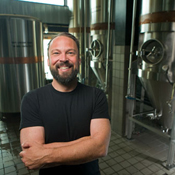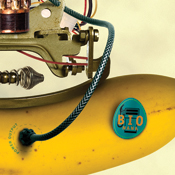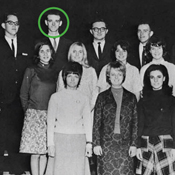Quoting the Notable Russell Simmons
Category: WebExtras
Russell Simmons is a cross between Tracy Morgan and Steve Jobs, between a totally unfiltered mind and a disciplined visionary. You never know what's going to come out of his mouth, but you do know it'll be thoughtful, provocative and insightful, with some goofiness thrown in for fun and a smidgen of street cred for effect. Simmons doesn't need more cred: not after co-founding Def Jam, the first of the major hip-hop record labels, and Phat Farm clothing line and, after that, more clothing labels: Baby Phat, American Classics and Argylculture—and not after using his wealth (estimated at $400 million) and his clout to advance racial relations and black-Jewish relations and to mend the sort-of ghettoes around the country similar to the neighborhood where he was raised in Queens, N.Y.
Simmons throws you off in another way: When you meet him, you're not sure whether to say “Yo” (a nod to his past) or “Namaste” (a nod to the yoga and meditation he's been doing for 15 years). Turns out a handshake and a smile are enough. After that, it's a rollercoaster ride through free associations and free rhymin', a free-for-all of digressions and wanderings and diversions and rambling, a bit hard to keep up with sometimes, but undergrid by a seriousness of purpose; by a spirituality that seeks to evaporate barriers and ignorances, injustices and stupidities; and by a genial sweetness somewhat at odds with the common image of anyone associated with hip-hop.
Simmons spoke Feb. 3 at the University of Baltimore about his new book, Super Rich: A Guide to Having It All. In Simmons' lexicon, “super rich” refers to spiritual—not material—wealth. Before the talk, he spoke backstage with Arthur J. Magida, UB writer in residence.
Magida: How do you define yourself?
Simmons: It depends on who I'm talking to. I'm an activist. I just did a commercial in support of gay marriage. I do work for PETA [People for the Ethical Treat of Animals]. I'm building this Peace Keepers program [a national movement that uses mentors to curb violence in unstable communities] in the 'hood. Through the Hip Hop Summit and other social and political groups, I help get out the vote. Through the Diamond Empowerment Fund, I help schools in Africa. I'm a yogi—for 15 years, I've been doing yoga every day. And I design clothing and jewelry. It's all part of my dharma [in Hinduism and Buddhism, the principles or laws that give order to the universe].
Magida: Have yoga ethics or yoga teachings changed your own business ethics or business procedure?
Simmons: Dramatically. I'm reminded every day my job is to be a good servant, that my dharma should be something I'm proud of, that I shouldn't do anything that is hurtful if I can help it. Yoga teaches ahimsa—that we should do the least amount of harm possible. That's why I eat what I eat. That's why I do a lot of stuff the way I do it.
Magida: Before you became so familiar with yoga, were you doing anything that was harmful?
Simmons: Well, I sold drugs, I was in a gang in Queens. We called ourselves the Seven Immortals. But I was just a kid.
Magida: Did you ever take a business course?
Simmons: No.
Magida: Yet over the years you've associated with businessmen and you've acquired some insights into how they think. If you were to design a curriculum for a business school, given who you are now and what you've done, what would you put into it?
Simmons: I would tell them to do things that are inspiring and uplifting and that you love. Find your passion and don't quit, and love how what you're doing affects the world—and it has to be exciting every minute. Either you love it or you don't. That's up to you. I'm a “passion” business person. I'm not a “numbers” business person, though I do think numbers are important. For that, surround yourself with smart people.
Magida: In your book you say, “Your gift [to the world] must be an honest expression of what's in your heart.” You advise people to write the screenplay that's burning a hole within them or design a website that speaks to their passions, even if they have difficulty getting investors. There are a lot of harebrained ideas out there—goofy screenplays or wild websites. How can we be more discriminating so there's a balance between our passions and the outer demand for whatever might be raging within us?
Simmons: All spiritual practices create discipline. When you do yoga, you smile and breathe in each pose. Some of them may be difficult, but if you can remember to smile in that pose, there'll be a moment when that pose is easy and it's a relief to go into it. You want to meet life that same way—with a smile and a full, deep breath. The more that we remember to do this, the greater the frequency that it will occur. Yogis say, “Practice daily,” which doesn't mean just on the yoga mat. That means all day. In the end, remembering to remember becomes your practice.
Magida: Is it hard to talk to business people about this?
Simmons: It's easier to talk to prisoners. It's easier to talk to kids in the streets. But you know, the business man needs it just as much as the prisoners or the kids on the corner.
Magida: You've made jeans that sell for $120. Yet, you're a yogi. How do you overcome the acquisitiveness, the materialism that's so pervasive in our culture?
Simmons: Each person needs to stop and look inside themselves for their happiness. As you become more connected, you find that those things were never very valuable. They have nothing to do with your happiness. It's OK to play with them but not to hold on to them. That's the key. As for designing and selling expensive jeans, it's a job. It's not a bad job or a good job. It's a job, and one that employs a lot of people.
Magida: You've said that by staying focused without expectations for the fruit of your labor, there are no limits to how far you'll go. The guy who washes dishes will become a restaurant entrepreneur. The office assistant will become a tycoon. But some people will wash dishes their entire lives and some will never be anything but an assistant to a tycoon.
Simmons: If you do your best at work without regard for the result, success may take you more than a lifetime. This is your path. At work, you study everybody's craft. That's part of your process. That's what all the guys who I know did until they became the president of a company or a tycoon.
Magida: There's a Zen saying, “Before you're enlightened, you chop wood and carry water. After you're enlightened, you chop wood and carry water.” You do the same stuff. All that's changed is you're enlightened. After all your yoga, how do you handle stress and frustration?
Simmons: Because I'm diligent in my practice, there's been a big shift in my ability to digest difficult times. It rolls off my back more often than it used to. At first, all this is a practice, and it's hard work. Eventually, it becomes second nature, and there's a stillness which nourishes ideas and imagination.
Arthur J. Magida is writer in residence at the University of Baltimore. In November, Magida will publish his latest book, The Nazi Séance: The Strange Story of the Jewish Psychic in Hitler's Inner Circle.





